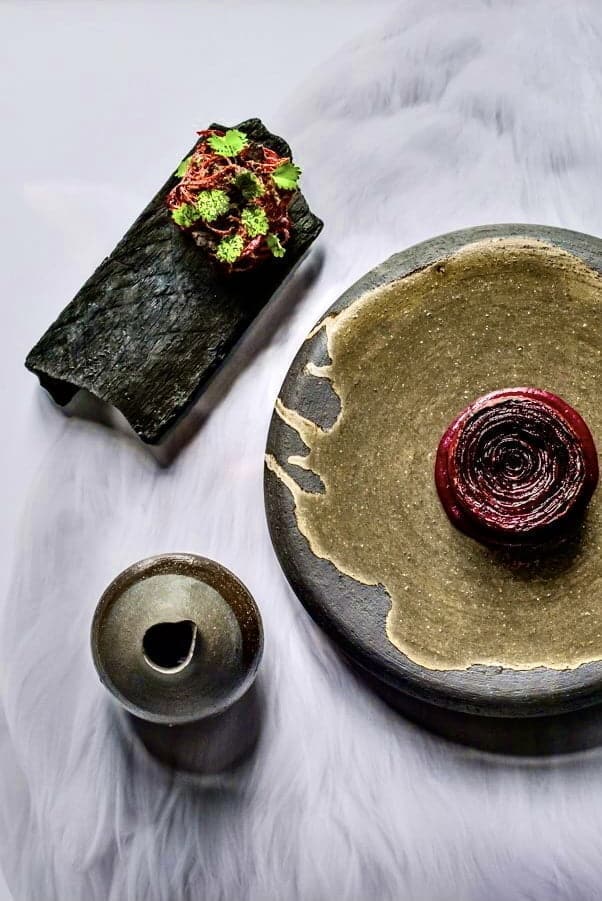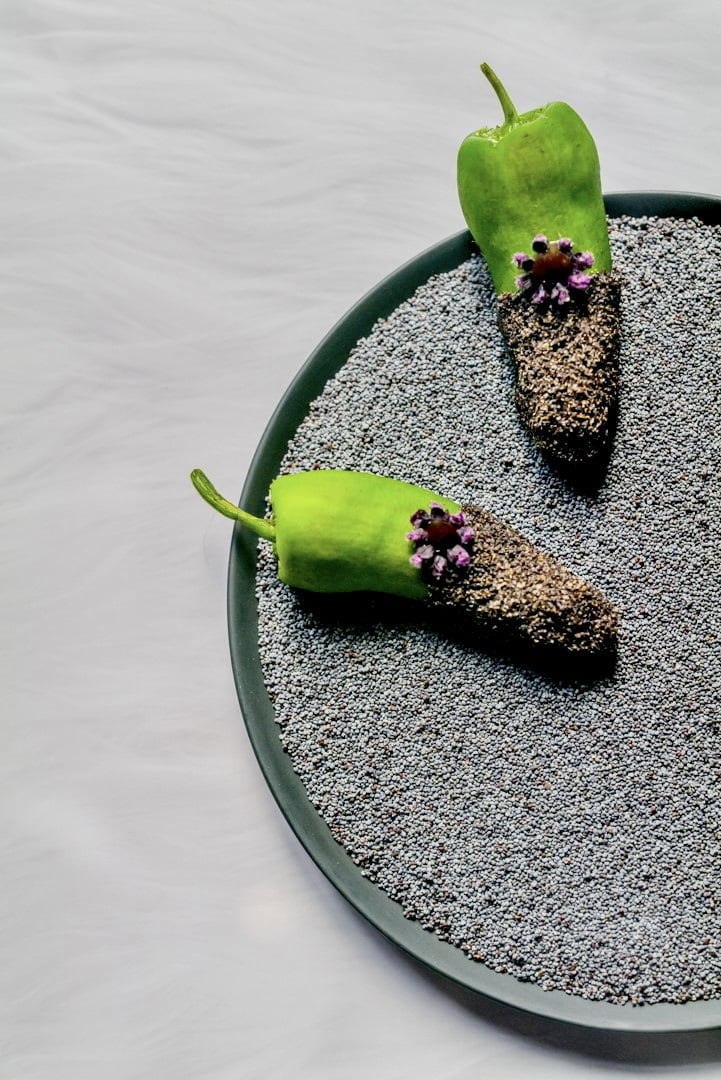
Ricky Saward, chef of Seven Swans, Frankfurt’s first Michelin sustainability award-winning vegan restaurant, talks about his culinary approach.
The aim of fine-dining restaurants is to bring the best quality food to the customers with the best presentation in the environments decorated by the best architects. That’s why when you think of fine-dining, sumptuous, state-of-the-art meat and fish dishes made from the highest quality ingredients come to mind. For a long time, chefs thought that a luxurious experience could only be achieved with meat and fish dishes, but it was realized a little late that vegetarian and vegan cuisines could offer the same experience, and many fine-dining vegan and vegetarian restaurants began to be awarded the Michelin star, which is considered the Oscar of the food world. Seven Swans, led by Ricky Saward, also received the first Michelin Sustainability Award in 2019. In this interview that I had the opportunity to do with the master chef, you will get to know Seven Swans and accompany his team to the Michelin Sustainability Award adventure.

I call it “adventure” because for Ricky Saward, who has worked in the classic kitchen for 10 years, working at the vegetarian Seven Swans, which he took over in 2018, was a struggle at first. Swans explains how this change affected his life: “Seven Swans, which I took over in 2018, was a vegetarian restaurant. For a classically trained chef who has worked in classical kitchens for ten years, this was an incredible change. But it was time for a change, both for myself and for the culinary arts. In 2019, no one was talking about vegan cuisine. But I’ve known for a long time that the future is in the vegan kitchen, away from luxury ingredients. So I’ve been cooking vegan meals for a year without publicly declaring it. Nobody noticed this. This was the signal for us to switch to a sustainable vegan cuisine with our own grown.”
Although Ricky, who was sure that he could not work at a desk job and wanted to bring his creativity to the fore, did not have a dream of being a chef at first, he knew how to continue his kitchen life as a chef, which he started as a dishwasher. Ricky Saward explained the reason why they switched from vegetarian to sustainable vegan cuisine, “He was the next step to take. I’ve never liked to immerse myself in the flow, I’ve always been interested in complicating and complicating things. Of course we risked losing the Michelin star, but someone had to start. Cooking vegan at this level has always been and still is a learning process for me,” she explains. What stands out most about Seven Swans is that almost all of their materials come from their own 5 hectares of permaculture land, 20 minutes outside of Frankfurt. Here they grow about 350 different vegetables and aromatic plants. To include all colors and scents, to explore them all and to use them in their kitchens is their dream. They pay attention to the fact that the products that are not grown in their own fields are also local. Ricky says, “We only use local products. In other words, we do not import products such as chocolate, olive oil and lemon from overseas. Sometimes we don’t even use some spices for this reason. We go as a team to gather our own materials, we spend more time in the fields and forests than we spend in the Seven Swans kitchen in the spring. It is a luxury to know what grows wild in our region, in which season,” he says, explaining how valuable the ingredients grown in nature, without pesticides, only with soil, water and sunlight, are for his restaurant.

In his first three months on Seven Swans, Rick cooked with just four ingredients—beets, celery, kohlrabi, and leeks. So he hunted weeds and flowers to sweeten his meals. For the sautéed leek they served as a starter, he went to the forest in the Taunus mountains, took the sap of a birch tree, and served the vegetable with both the sauce prepared with this extract and the fried leaves. He gave the beet as a sorbet with milk foam and acacia flowers next to the einkorn pudding. It is possible to understand the culinary understanding of the chef, who said, “It was a simple and rustic dessert, but really delicious,” from this starter and dessert. The chef manages to find the most natural, simplest ingredients and bring them to an extraordinary taste with small touches. It also includes aromatics and different cooking techniques in its cuisine. Ricky explains his interest in different techniques this way: “I like to use various techniques, to experiment with them. The techniques we use most are: canning, pickling, fermentation, drying, ripening. The rotary evaporator is one of the indispensable tools of our kitchen.” Here are the chef’s ideas about aromatics: “My job is to offer my guests flavors they’ve never tasted. And I have to do this with vegetables that everyone knows and everyone has access to. It’s interesting to show people what the stuff grown on their doorstep has to offer. I have a natural, minimal and material-oriented style. Food comes to life in my head with inspiration from nature.”


Dishes such as the “Carrot, Pepper, Currants” meal they cooked at Seven Swans (carrots dried for six hours and marinated in barbecue sauce, sweet-sour pickles made from peppers picked the previous year, with roasted and fermented currants) ushered in a new culinary era. Your guests simply enjoy something without considering whether it is vegan or not. As Ricky puts it, it is actually “the art of creating flavors and textures with materials that nature offers and always used”. This is exactly what Seven Swans cuisine represents.
After his first year at Seven Swans, the chef was invited to the Michelin event in Berlin, one day before the 2019 Germany Michelin stars were announced. And at the insistence of the editor, he found himself at the awards ceremony the next day. Stating that this was a great surprise for him, Ricky says about the award night: “The night we received the Michelin Germany Sustainability award was crazy for me, I had no idea what to live. I didn’t realize what was going on until I got on stage. I was the only one without a tuxedo, walking out of the kitchen in jeans and a loose shirt. I felt like the dumbest person in the world. I was called to the stage and started to explain who I was and what I was doing in front of a hall full of Michelin star chefs. It was crazy.” Ricky was the first and last chef to receive the sustainability award. A year later, the name of this award was changed to the green star award.

If Ricky, who thought it was all a dream, was told that he would get a Michelin award as a teenager, he might think that they were making fun of him. Because Ricky probably wouldn’t have considered cooking a career if his mother hadn’t forced him to start working as an assistant cook in a West German nursing home when he finished school at the age of 16. Learning to cook there, Ricky worked in various hotels in various cities, and then received a five-month scholarship at four of New Zealand’s most famous restaurants. One of these restaurants was Chef Michael Meredith’s Merediths restaurant, which had a great influence on Ricky’s culinary philosophy. Ricky explains the contribution of what he did there to what he put forward in his restaurant: “Every day we used to go to a different field, forest and collect materials. I had no idea what Michael was aiming for. I knew only 10 percent of the materials we used, but I was having a lot of fun. I finally grasped his ideas and philosophy and realized what I wanted to do.” Based on this desire, he was able to show the courage to transform Seven Swans into a vegan restaurant. You read that right, dare, because going from a restaurant that serves food made with animal products to a vegan restaurant is pretty risky. Ricky does not use any material that comes to mind when people think of luxury, and he founded a vegetable-based kitchen, risking losing his existing customers and, more importantly, Michelin. “This is how it was supposed to be,” the chief says of it. “You can’t succeed without taking risks. To change things, even if you are alone, you have to take some steps. We renew ourselves every year. This is the only way to progress and evolve. Stagnation means regression.”
The chef is constantly trying different recipes, different techniques, and is in pursuit of creating new flavors with the vegetables and fruits they grow themselves or the ingredients they buy from local producers. Ricky spends his free time in the permaculture field, thinking about how to get different flavors. Because he wants Seven Swans, which he describes as “a restaurant that is not too decorative, with a living room atmosphere and where all the focus is on the plates”, to change and evolve like nature. For this, his focus is not a Michelin star either. “Ultimately, every award is a confirmation of hard work, lack of free time, tears and pain. But this award is a source of motivation for me, and it would be wrong to just skim our reputation,” says Ricky, describing Seven Swans as a “vegan, local, seasonal, root-to-leaf sustainable and ground-to-table restaurant”.

“We have a concept that never stands still and continues to evolve every day. Nature still offers us an endless amount of things to explore, and our goal is to continue the search and use them in our kitchen,” says Ricky, and will continue to do his best for you to eat the delicious bites with nature, feeling almost earthy. And there is no doubt that they will once again be awarded the Michelin star. Because they always aim for the more natural and delicious, they create works of art, not food, by using their creativity. Natural, delicious and creative. What else do you need to deserve a Michelin?
If you happen to be in Frankfurt, do not return without stopping by Seven Swans, where you will feel yourself among the greenery, trees, flowers with the scents you smell when you close your eyes, and enjoy delicious bites by making sure you eat the most natural. I’m sure both your palate and your soul will be happy to have it there. Nature is always good…